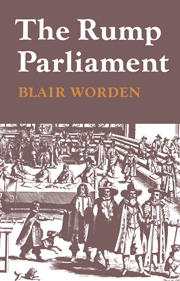Book contents
- Frontmatter
- Contents
- Dedication
- Acknowledgements
- Author's Note
- List of abbreviations
- Introduction
- PART ONE THE RUMP AND THE RUMPERS
- PART TWO THE RUMP AND REFORM
- 6 Law reform
- 7 Puritans and politicians
- 8 Electoral reform
- PART THREE THE STRUGGLE FOR SURVIVAL, FEBRUARY 1649–SEPTEMBER 1651
- PART FOUR PARLIAMENT versus THE ARMY, SEPTEMBER 1651–APRIL 1653
- PART FIVE THE DISSOLUTION OF THE RUMP
- APPENDICES
- Bibliographical Guide
- Index
- Frontmatter
- Contents
- Dedication
- Acknowledgements
- Author's Note
- List of abbreviations
- Introduction
- PART ONE THE RUMP AND THE RUMPERS
- PART TWO THE RUMP AND REFORM
- 6 Law reform
- 7 Puritans and politicians
- 8 Electoral reform
- PART THREE THE STRUGGLE FOR SURVIVAL, FEBRUARY 1649–SEPTEMBER 1651
- PART FOUR PARLIAMENT versus THE ARMY, SEPTEMBER 1651–APRIL 1653
- PART FIVE THE DISSOLUTION OF THE RUMP
- APPENDICES
- Bibliographical Guide
- Index
Summary
Nothing better illustrates the limits of seventeenth-century English radicalism than the faith displayed by reformers of almost every variety in the institution of parliament. The army reform programmes of the later 1640s are an ample testimony to that faith. It was the reverence of the army leaders for parliament, too, which late in 1648 persuaded Ireton to abandon his plan for a forcible dissolution and to settle instead for a mere purge, a decision which ensured the prolongation rather than the destruction of the Long Parliament and consequently the defeat of the army's reforming ambitions. Men who were willing to undertake so revolutionary a step as the execution of the king were nevertheless prepared to leave the Rump in power. By 1653, when the Rump had become wholly discredited in radical eyes, the Fifth Monarchists were prepared to do away with parliamentary institutions; yet even Barebone's assembly which succeeded the Rump was modelled, as far as was compatible with the saintly programme, on previous parliaments. When it met it immediately gave itself the title of parliament and scrupulously observed traditional parliamentary procedures.2 In the later 1640s and early 1650s it should have been obvious that the Long Parliament would never fulfil the army's reforming hopes, yet time and again radicals met the problem not by challenging the institution of parliament but by demanding changes in the manner in which parliaments were elected.
- Type
- Chapter
- Information
- The Rump Parliament 1648–53 , pp. 139 - 160Publisher: Cambridge University PressPrint publication year: 1974

